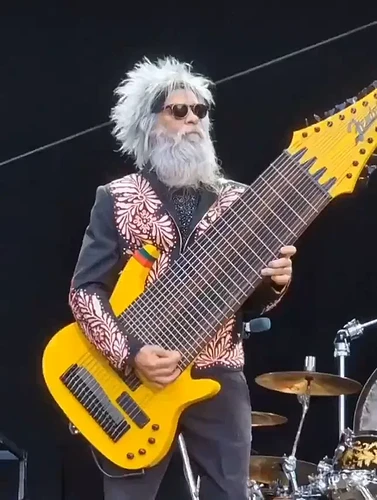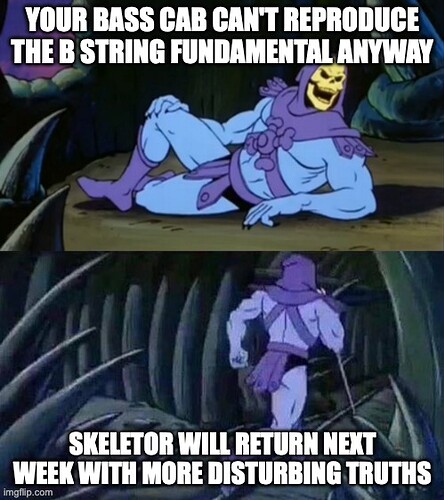They actually work considerably better for this IMO (again, due to the timbre).
and also due to the amps that are made for those frequencies ![]()
For sure. Also, a lot of what I see people do with 6 string basses tends to be tapping, and guitar hammer-ons sound much, much better than bass tapping, IMO ![]()
I think it’s great that you got yourself a 6-string and enjoy playing - that is really all that matters in the end.
As pointed out by others, some of your arguments are flawed. Also, one could question the underlying “logic” - why stop at 6? Everything you can play on a 6-string you can play on a 7-string ![]()
The answer is obvious, as also pointed out by @howard : it becomes a “cost”-benefit game. More weight/girth, harder to play for most uses vs (a few) more notes and some better manoeuvreability (sp?), i.e., being able to stay in position longer.
For some genres, 6-string basses are almost required; for others, they are a “liability” ![]()
I am trying to think of notable artists on songs I listen to with any regularity that used a 6 and I can only think of two - Hooky plays a Shergold 6er on a couple songs (but not primarily), and then Boh with his many AtelierZ’s.
I don’t count the standard Fender Bass VI (a la Robert Smith) as it’s more of a baritone guitar (and is tuned and played like one). The Fender Jazz Bass VI is a 6 but I don’t know of a single artist using it.
@joergkutter is it a jazz thing?
BTW @KevinM - I agree 100% with this too. You found something you like and that’s awesome.
I agree with this too.
ref: Fender Rumble 100 frequency response. B0 is 30.1Hz.
On a Rumble 100, below about E1 you are increasingly hearing higher harmonics, as the response rolls off.
I think you’re right, I’m wrong! It just seems like more since you can play the most beautiful chords above the 12th fret.
Yes, some modern jazz players prefer a six as it provides a bit more range and options for solos (and chordal playing). John Patitucci, Jimmy Haslip, Dane Alderson and many other modern jazz/bebop/fusion players use a 6.
Also, 6-string basses are popular for many gospel players; Andrew Gouché and Sharay Reed being fairly well known examples.
Yeah a 6 definitely brings more flexibility for chording on the high end.
Interesting, thanks!
outch.
Damian Erskine talked about this recently. He used to be more in the fusion/jazz area (and many still think of him as a jazz player; a bit to his chagrin) and was thus playing a 6-string for a long time.
However, in the past 3-4 years, he got more interested in groove-oriented music, R&B with some funk thrown in, and he ditched the 6-string in favor of a 5-string, as he no longer “needs” the C string really; not doing those jazz-type solos, and fewer solos in general. He still likes the low notes of the B-string and the “staying in position” options of a 5-string though.
So, yeah, what type of music you play should inform the choice of “weapon”
maybe you’re just a guitarist
![]()
![]()
To be fair I think this is due to the cheaper speakers Fender uses. There are cabs with better responses. You could probably drop a better 12" into the Rumble 100 cab and then only have like -12-24dB or so rolloff there. That’s still a lot but at least it would let more of the fundamental through.
yeah that’s for sure.
I enjoy having the extra low B on my 5 string, but have no interest in adding another string. The neck width and weight is fine for me, and for the music I am interested in it is more than sufficient. Not interested in 6 strings of any kind
The Fender Jazz Bass VI is a 6 but I don’t know of a single artist using it.
Yeah, none of the players I mentioned further above uses a Fender 6-string. It’s all more “modern” designs and pickups (Yamaha, Ibanez, MTD, Fodera, … those kind of brands (and even more boutique)).
And, just apropos:



